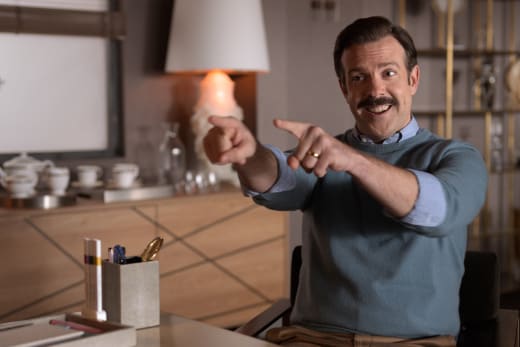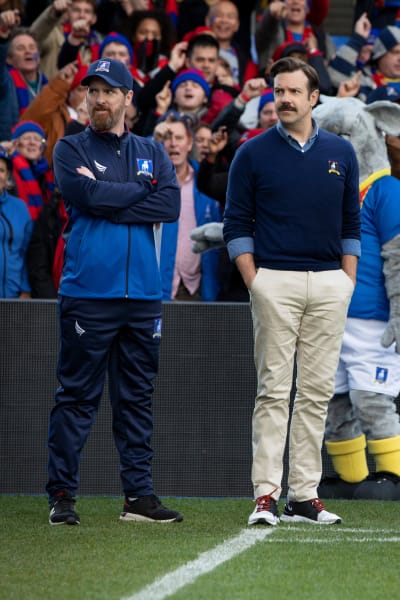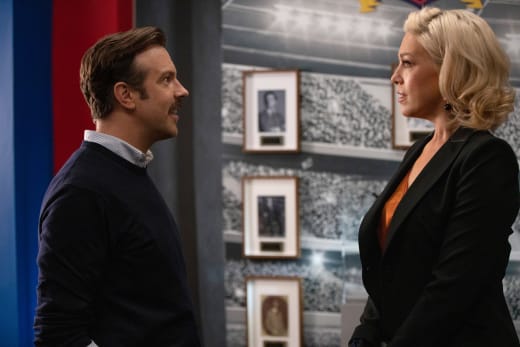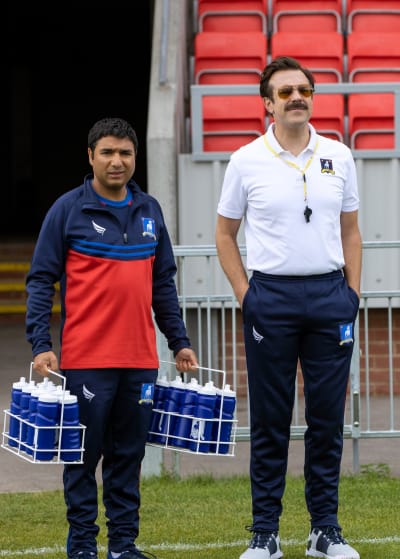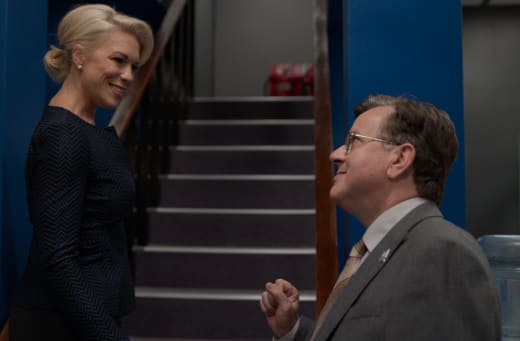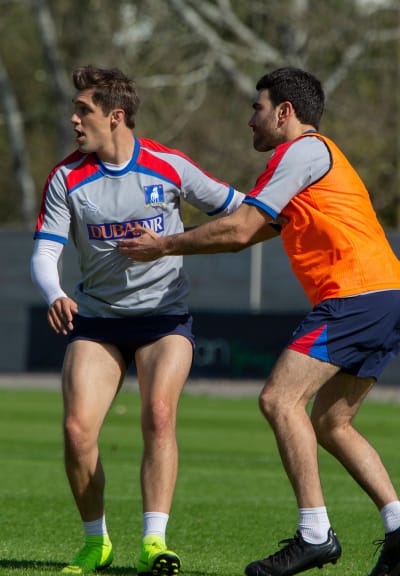Our final interview leading up to the premiere of Ted Lasso on Apple TV+ is with the man himself, Jason Sudeikis, aka Ted Lasso.
You know him from his work on Saturday Night Live, The Last Man On Earth, 30 Rock and in films like Horrible Bosses (1 & 2) and We’re the Millers. And if, as Bill Lawrence shared with us, you feel like you know Jason through is work, you can rest assured he is just as kind and warm-hearted as he often seems to portray himself.
And Ted Lasso will be the character you not only want to emulate in 2020 but the one you will want to hug for making you feel so darn good. We can thank Jason for that.
The Premier League commercials offered a really good foundation for Ted Lasso, but how did you decide to flesh him out as a full character?
Well, I appreciate you saying that about the commercials, but, I mean, that was really the entree because you only get to do things more than once in life, but certainly in show business — if the first one goes well, ergo, if people enjoy it, there’s the crowds, the critics, or if it makes a bunch of money.
Now, this was a commercial, and it did its intended purpose of trying to get American eyeballs on this interesting game they call soccer, or football in the UK. And that allowed for the second commercial.
And in doing the second commercial, in 2014, the first one being in 2013, we really enjoyed the thing that we unlocked with the character being his enthusiasm, his eternal optimism, and his hopefulness.
And that was something that spoke to me, in a way that, okay, why is he like that? And everybody is going through something. Even if they’re the happiest person in the world, it’s how they’re responding to any of the negatives and valleys that we go through, in life, as any human being, regardless of one’s station in life.
And that just led to more questions, that we just felt compelled to have to try to answer, for ourselves, before thinking we’d take it to anyone or anywhere. And so my friends, Joe Kelly and Brendan Hunt, who are writers and producers on the show, did the commercials with me. Brendan also is an actor on the show. He plays Coach Beard, my assistant, in the commercials and the program.
We sat down for a week and just tried to write a pilot, an initial script, come up with a premise there and type that out, and then a six to 10 episode arc. And we did that in a week. And it just flowed out of us, with plenty of work to still be done, obviously. But it proved to us that, oh, there’s something here.
Then life just sort of happened. Olivia and I had had a kid. Joe went and created another show, and Brendan was working. And so, two years after that, Bill Lawrence entered our sphere, that fellow that created Scrubs and knew a ton about television. And then, two years after that, here I am, chatting with you about the fact that it’s going to be shown to the world, here in two weeks.
Well, they say timing is everything.
Yeah, they sure do.
And given 2020 with civil unrest, health issues, and unemployment sky-rocketing, can you even possibly imagine a better time for something that is so uplifting to drop?
I mean, I know. It’s nuts because, again, this was conceived in 2015. A great deal of the work we did there maintains throughout this endeavor. It’s fascinating. And, also, a thing that I think is kind of fun to point out is that, early on, it was a very high concept.
We were trying to make this idea plausible, in real life, because people would constantly wonder, is it believable that someone that has no idea what they’re doing, really be put in charge of something as important as a professional soccer team?
And now it’s like, oh, one could make the argument that someone who has no idea what they’re doing is in charge of something a lot more important than just a soccer team, with all respect towards soccer fans in the UK because they would maybe argue one’s just as important as the other. But now it’s a parable. Now, the show’s a metaphor.
And, yes, there’s things going on in that show, that predate giant movements and necessary movements like Me Too and Times Up and Black Lives Matter. And yet, what Ted is and what Ted is about and his philosophy and the way he moves through the world is something that I think, at the end of the day, will be the way that those types of movements maintain and continue on, generation to generation.
That’s a great thought. I like that a lot. The cast is incredible. You got some really great people.
How do the characters change? If you had the arcs written so far in advance, did you make any changes, based upon the great cast that incorporates the great characters you’ve created?
Things do change. The characters all stayed the same. No one really modulated that much, but I believe in a philosophy articulated by Quincy Jones, in the great documentary that his daughter, Rashida, made about him, where he says, “You got to get it 70% of the way, and then you got to leave that extra space for magic.”
And I believe that magic is where art really lies, especially ensemble pieces like this show or my background in sketch comedy or improvisation, where I can tell these men and women that we found, a lot of them through our great casting director in the UK and in Theo Park, that what with they went through prior to this moment and what they’re going to go through further down the line, I need them to make this person themselves.
And one way to manifest that is to let them anglicize things. Early on, the Higgins character, who’s the assistant to the owner, the female, Rebecca Welton, he would call her ma’am because that’s how, in the Midwest, we show respect. You call someone ma’am. To hear a Brit at the table reads say, “Ma’am,” it sounds like he’s saying, “Mom.”
[laughs] And that’s a very different show than the one we were making. So you allow them the opportunity to make it their own. I think that’s very important. But the chords to the song are written, but I encourage and empower them to solo in any way.
And then a trick that I learned at Second City, through a brilliant director and musician, Jeff Richmond, who also is married to Tina Fey, he would direct shows, and he’d start rehearsal with like, okay, what are talents that you guys have? What are things like I can spin a basketball, or I can do the dance from Thriller or whatever it is, and then you put that in the show.
And so that’s just something I keep my ear open to, when not knowing how far through the series you’ve gotten, but I learned early on that, again, Higgins was a very good musician and could play the double bass, the standup bass.
And so, boom, it’s like, oh, I know where that’s going. I know what that is. And you just listen to those things, and you try to make it very personal to the person that you’re lucky enough to get to play those parts.
And my last question for you is, speaking to talents, you cast actors who then had to play football. How did that work out for you?
Pretty well, with the exception, and I don’t think he minds us saying it because he owns it, but Brett Goldstein, who plays Roy Kent, was the only one that didn’t have the experience of playing it. But we got a great double for him.
But, for the most part, that’s just all those guys, over there, know what they’re doing, like how any kid that was a Disney kid, or even, remember, it feels like everybody in the 30s, 40s, 50s could do 20 things. Johnny Carson was a great drummer and a magician. I feel like the UK has that with soccer.
All those guys played soccer, at some point, and so it’s in them. And they’re all giant fans. And so, yeah, one of the luxuries and benefits of working over there is not only finding all this great local talent, and especially people that maybe people haven’t seen a lot, before, or prior to this moment.
So they’re going to discover them through this process, is we were able to pull really good players, who could do all that choreography because it is. It’s basically a dance routine that has to end, instead of a big lift, like Dirty Dancing, it has to end with a heck of a goal.
—————————————–
We’ll be back tomorrow with a full review of the first three episodes that drop on Apple TV+ and weekly with reviews for subsequent episodes as they drop. Will you be watching?
Carissa Pavlica is the managing editor and a staff writer and critic for TV Fanatic. She’s a member of the Critic’s Choice Association, enjoys mentoring writers, cats, and passionately discussing the nuances of television and film. Follow her on Twitter and email her here at TV Fanatic.

